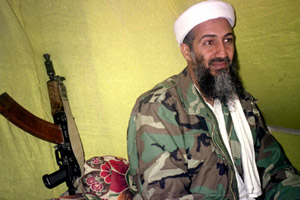New details in the bin Laden docs: portrait of a fugitive micro-manager
By Sebastian Rotella in ProPublica
During his final years, Osama bin Laden expressed interest in everything from killing President Obama to his deputies’ personalities to an article in an extremist magazine that he didn’t like, according to two U.S. officials familiar with material seized during the raid that killed bin Laden.
A trove of digital communications and hand-written notes show how bin Laden ran his weakened network from his solitary hideout in a garrison town in Pakistan. He was especially engaged in decisions about leadership posts and developing plots, the officials said.
Bin Laden’s writings discuss his strategic goal of carrying out attacks that would prevent President Obama from being re-elected, though he also wrote that “the alternative could be worse,” a U.S. counterterror official said.
“He talks about targeting priorities,” the counterterror official said. “He says the president is of course the top target if you could get a shot at him. Also the military chiefs like the chairman of the Joint Chiefs of Staff, the defense secretary, top military people. There is a note indicating that the vice president is not an important target because that position has less weight.”
The passage was less a discussion of concrete assassination plots than strategic musings, the counterterror official said. Another U.S official said it was part of a message intended for a deputy. It is not always clear if the messages were actually delivered. The material has been translated from Arabic and culled from computers, discs, thumb drives and bin Laden’s handwritten notes, said the officials, who spoke to ProPublica on condition of anonymity.
Bin Laden clearly played a role in al Qaeda’s operational, tactical and strategic planning, the officials said. That contrasts with assertions by officials in Pakistan and the West over the years that he was dead, in another country or cut off from his network.
“You could describe him as a micro-manager,” a U.S. official said. “The cumbersome process he had to follow for security reasons did not prevent him from playing a role…He was down in the weeds as far as best operatives, best targets, best timing.”
Bin Laden was bent on inflicting mass-casualty attacks on the West, the U.S. official said. At the same time, however, he criticized an online propaganda magazine edited by a young American in Yemen, saying the bloodthirsty tone of an article could harm al Qaeda’s image among Muslims, according to the U.S. counterterror official.
The magazine, called Inspire, “apparently discussed using a tractor or farm vehicle in an attack outfitted with blades or swords as a fearsome killing machine,” the official said. “Bin Laden said this is something he did not endorse. He seems taken aback. He complains that this tactical proposal promotes indiscriminate slaughter. He says he rejects this and it is not something that reflects what al Qaeda does.”
The sentiment apparently evokes bin Laden’s concern — previously expressed in al Qaeda letters intercepted in 2004 — about backlash among Muslims who feel the network has gone to violent extremes, especially in Iraq, and killed many Muslims in the process.
A clandestine courier system enabled bin Laden to send strategic directives to the network’s core in Pakistan and its affiliates overseas, but he was hampered by the lack of phone and Internet access in his compound — a measure to avoid detection.
“In a sense what we have here is internal discussion,” the counterterror official said. “And also you have a leader alone, writing down his thoughts… It’s kind of like the old concept in the Navy when captains thought they might lose visual contact. They needed to know the commander’s intent in the contingency of having to make decisions on their own. When bin Laden writes to his deputies, he is reinforcing their knowledge of the commander’s intent.”
Bin Laden communicated with deputies such as Mustafa Abu-Yazid, a veteran Egyptian boss who was al Qaeda’s operations chief until he was killed in a U.S. missile strike last year, according to the official. Yazid, based in the northwest tribal areas of Pakistan, sent outgoing orders to commanders in Pakistan or affiliates in other countries, and relayed their messages to bin Laden’s hideout in Abbottabad near Pakistan’s capital.
The courier system also permitted bin Laden to communicate directly with other deputies, the U.S. official said.
One exchange shows Ayman al Zawahiri, the Egyptian ideologue regarded as the number two chief of al Qaeda, communicating with bin Laden through Yazid, who most Western counterterror officials saw as number three in the hierarchy.
The leaders discussed the personality of an up-and-coming Libyan leader named Atiyah Abd-al-Rehman, known widely as Atiyah, the officials said.
“Bin laden tells Yazid that other leaders have told him that Atiyah is seen as a bit undiplomatic and heavy-handed in his dealings with others in the group,” the counterterror official said. “Bin laden’s language indicates that he likes Atiyah, but he is mentioning the discussions about Atiyah that he has heard from others in AQ.”
Despite his perceived charm deficiency, Atiyah’s star has risen. After Yazid was killed, bin Laden appointed Atiyah as operations chief, according to Western counterterror officials. Last month, German police arrested three suspected Moroccan militants in Dusseldorf accused of preparing a bomb attack on a transportation target. The suspects were in contact with Atiyah and Younus the Mauritanian, a chief in Pakistan who has been leading operations against foreign targets, officials say.
Bin Laden ordered Atiyah and Younus to concentrate on attacking Europe and the United States, the officials said.
Evidence in a pending court trial in Chicago reveals that “the elders,” whom court papers identify as the top al Qaeda leadership, were eager to execute a plot against a Danish newspaper that had published caricatures of the Prophet Mohamed. That plot was aborted in late 2009.
The Associated Press reported tonight that some of bin Laden’s writings show him musing over how many Americans he would have to kill to force the U.S. to withdraw from the Arab world and concluding that the body count would have to be in the thousands.
Bin Laden also managed to retain authority over al Qaeda’s affiliates in Yemen, North Africa and Iraq, the U.S. official said.
“It was not the same degree of detailed involvement, but he played a huge role in leadership,” the U.S. official said.
The materials seized during the May 1 raid in Abbottabad indicate that Bin Laden communicated with the network’s most active and dangerous wing, Al Qaeda in the Arabian Peninsula, through his operations deputy in Pakistan, who forwarded directives through emails and couriers to the affiliate’s leaders in Yemen, the counterterror official said.
Intelligence gathered months before the raid revealed a tell-tale exchange with the al Qaeda leader in Yemen. The leader, a Yemeni, wrote to bin Laden with a surprising proposal: He suggested that he step down as chief of the affiliate in favor of Anwar al-Awlaki, a Yemeni-American ideologue. Awlaki’s influence has been revealed in a string of recent plots against the U.S., including the attempted Christmas bombing on a Detroit-bound flight in 2009.
The leader explained that naming Awlaki as his replacement would be a propaganda coup. It would take advantage of the cleric’s popularity among Westerners, especially Americans, and have a strong impact on recruitment, according to the counterterror official.
The leader in Pakistan rejected the proposal, however, according to the official. “Bin laden’s message was essentially, I know you. I trust you. Let’s keep things the way they are.”
Awlaki has eluded a number of U.S. missile strikes on his suspected refuge in Yemen.
The U.S. task force that is poring over the intelligence haul from the raid has three priorities: detecting imminent plots, tracking other al Qaeda leaders and investigating bin Laden’s support network in Pakistan. The last task confronts a delicate question: whether Pakistani security forces were involved in protecting bin Laden, who spent at least five years in the compound near a military academy.
“There is no evidence that the Pakistani government knew he was there,” the U.S. official said. “But the questions still have to be answered.”
























Comments